
The Portuguese Armed Forces are the military of Portugal. They include the General Staff of the Armed Forces, the other unified bodies and the three service branches: Portuguese Navy, Portuguese Army and Portuguese Air Force.
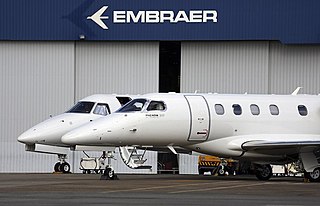
Embraer S.A. is a Brazilian multinational aerospace corporation. It develops and manufactures aircraft and aviation systems, and provides leasing, equipment, and technical support services. Embraer is the third largest producer of civil aircraft worldwide after Boeing and Airbus. The company also has a significant presence in military aviation, ranking among the top 100 defense contractors. It is headquartered in São José dos Campos, São Paulo, Brazil, with offices and operations in China, the Netherlands, Portugal, Singapore, and the United States.

The de Havilland Canada DHC-1 Chipmunk is a tandem, two-seat, single-engined primary trainer aircraft designed and developed by Canadian aircraft manufacturer de Havilland Canada. It was developed shortly after the Second World War and sold in large numbers during the immediate post-war years, being typically employed as a replacement for the de Havilland Tiger Moth biplane.
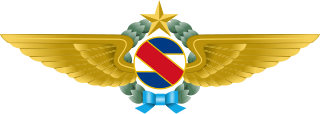
The Uruguayan Air Force is the air service branch of the Armed Forces of Uruguay. Originally created as part of the National Army of Uruguay, the Air Force was established as a separate branch on December 4, 1953. It is the youngest and also the smallest branch of the Armed Forces of Uruguay. In 1977 it was determined that the mission of the Air Force is to conduct strategic and tactical aerospace operations on behalf of the national defense, exercising the sovereignty of the Uruguayan airspace and defending the independence, integrity, constitution and laws of the country. The Air Force must also conduct search and rescue missions and plan, propose, execute and supervise the necessary measures for the development of the aerospace potential, while providing any necessary and possible logistical support during the natural disasters that the country may suffer. Since 1985 this has been always carried out under the command of the President of Uruguay, and according to the Minister of National Defense.

The Brazilian Air Force is the air branch of the Brazilian Armed Forces and one of the three national uniformed services. The FAB was formed when the Brazilian Army and Navy air branches were merged into a single military force initially called "National Air Forces" in 1941. Both air branches transferred their equipment, installations and personnel to the new force.

The Portuguese Air Force is the aerial warfare force of Portugal. Locally it is referred to by the acronym FAP but internationally is often referred to by the acronym PRTAF. It is the youngest of the three branches of the Portuguese Armed Forces.
TEAM Linhas Aéreas Ltda. was a domestic airline based in Rio de Janeiro, Brazil, founded in 2001. On April 16, 2012, the airline had its operational license suspended and on October 3, 2014, the license was revoked.

The Embraer EMB 312 Tucano is a low-wing, tandem-seat, single-turboprop, basic trainer and light attack aircraft developed and produced by Embraer in Brazil. The Brazilian Air Force sponsored the EMB-312 project at the end of 1978. Design and development work began in 1979 on a low-cost, relatively simple, new basic trainer with innovative features which eventually became the international standard for basic training aircraft. The prototype first flew in 1980, and initial production units were delivered in 1983.

Indústria Aeronáutica Neiva is a subsidiary of Embraer which produces airplanes and aircraft components. Its main product is the Embraer EMB 202 Ipanema, the most employed agricultural aircraft in Brazil and the first alcohol-powered airplane. Neiva delivered more than 3,700 aircraft until early 2006.

The Embraer C-390 Millennium is a medium-size, twin-engine, jet-powered military transport aircraft designed and produced by the Brazilian aerospace manufacturer Embraer. It is the heaviest aircraft the company has constructed to date.
TAP Maintenance & Engineering – the maintenance, repair and operations center of TAP Air Portugal airline – is located at Portela Airport, Lisbon, Portugal.

Afonsos Air Force Base – BAAF is a base of the Brazilian Air Force, located in the district of Marechal Hermes, in Rio de Janeiro, Brazil.

Piquiatuba Transportes Aéreos is a domestic airline based in Santarém, Pará, Brazil. Founded in 2005 it operates regular charter flights.
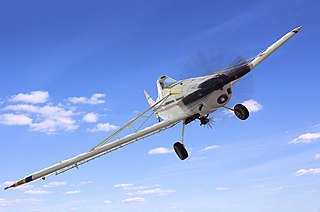
The Bárcenas B-01 is a low-wing monoplane agricultural aircraft built by Aeroservicio Bárcenas S.A.
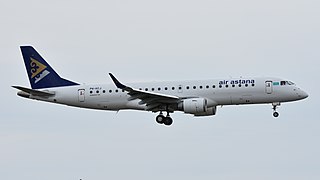
Air Astana Flight 1388 was a repositioning flight from Lisbon to Almaty, with a refueling stop in Minsk. On 11 November 2018, shortly after takeoff, it experienced severe control issues. After 90 minutes, it landed safely at Beja Airbase, with no fatalities.
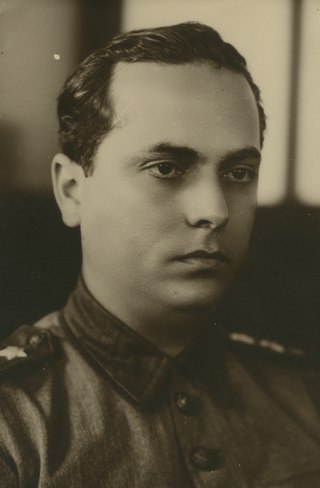
Antônio Guedes Muniz was the pioneer of the Brazilian aviation industry.
Saab Aeronáutica Montagens SA is a Brazilian aeronautical company which has operated since 2018 as a subsidiary company of the Sweden aerospace conglomerate Saab AB. The Brazilian aerospace engineering company, Akaer Engenharia SA, has a shareholding in this company.

Placar Linhas Aéreas is a Brazilian non-scheduled passenger and cargo airline, founded in 2022 and headquartered in São Paulo, Brazil. It received its first plane and began operations in 2023, focusing on transporting football teams to play local matches in Brazil and also in other countries in South America.















